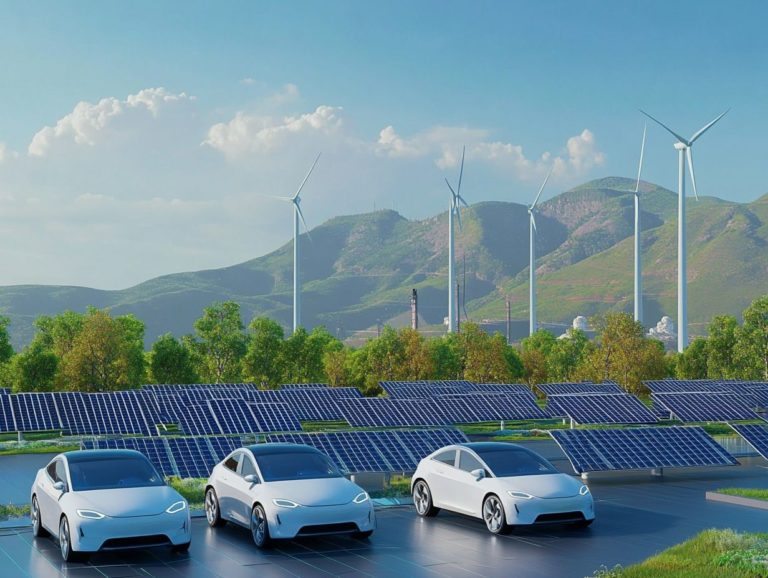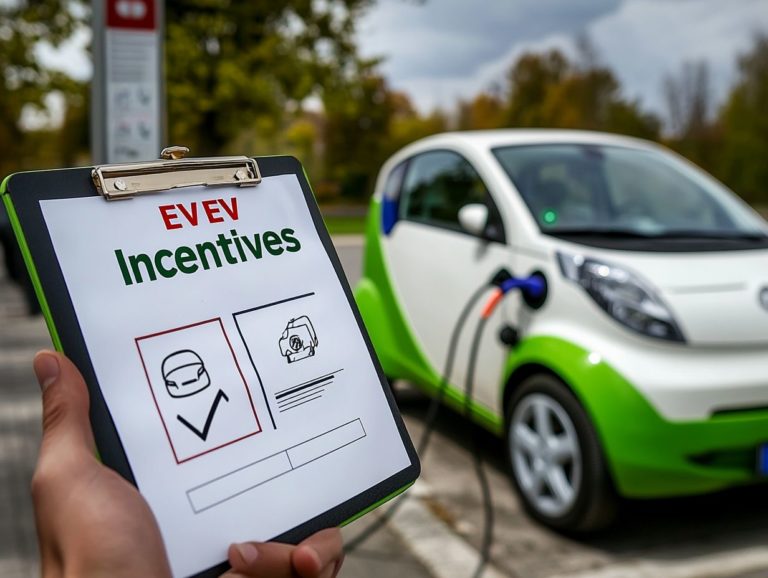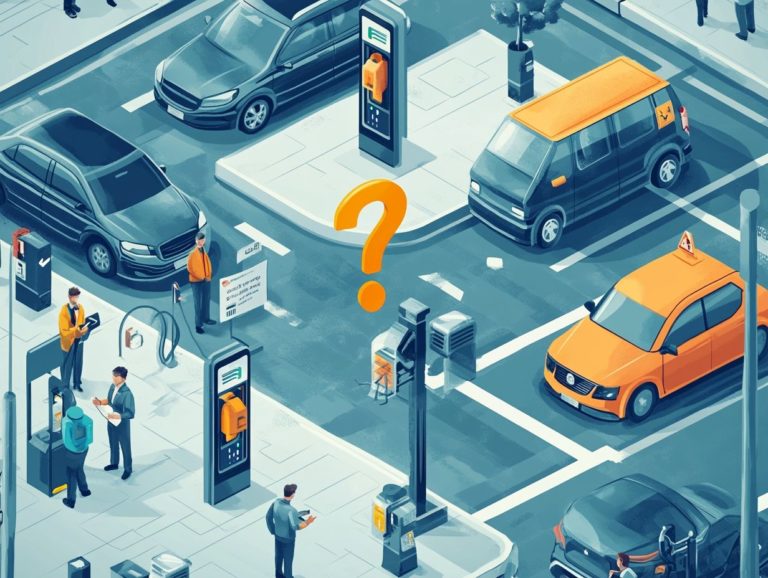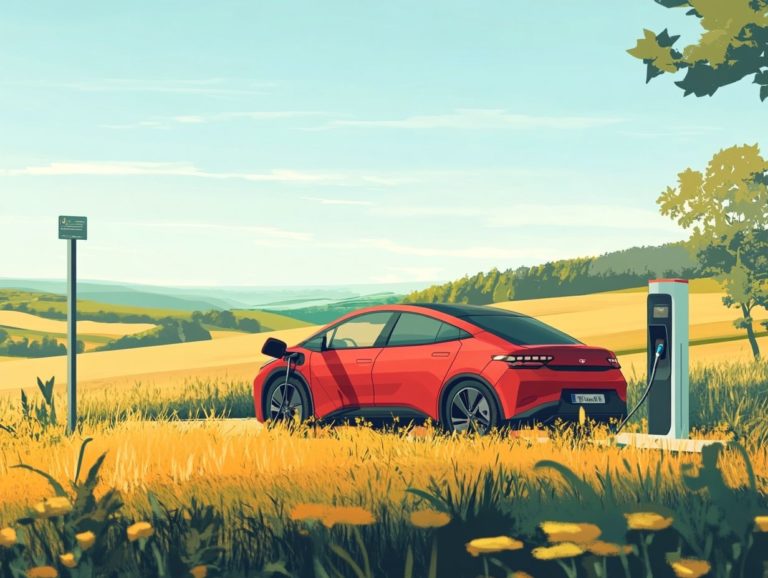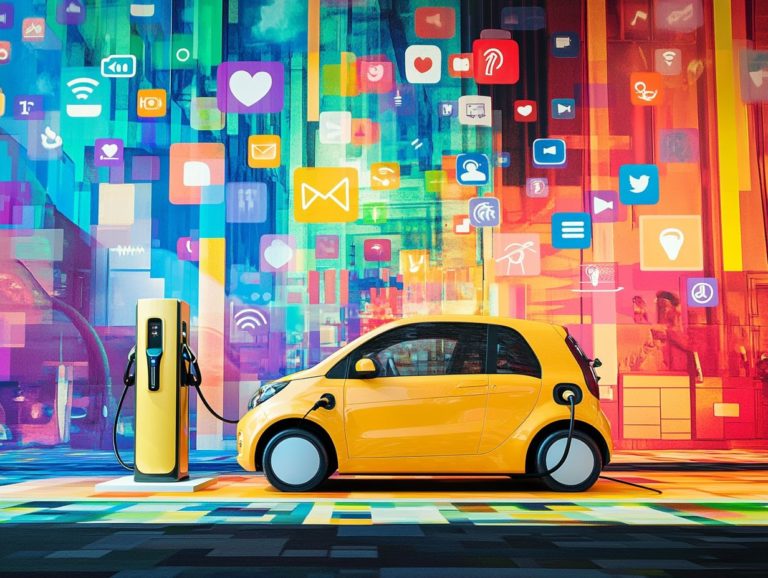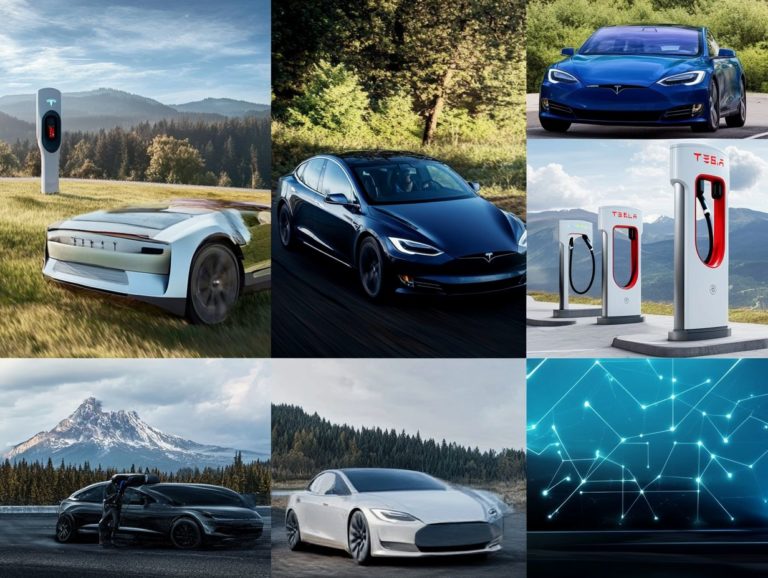Consumer Preferences in EVs: What’s Changing?
Electric vehicles (EVs) are reshaping the car market, influenced by your evolving preferences and a growing commitment to sustainability!
This article delves into current consumer preferences in the EV market, shedding light on what influences your buying choices, the most sought-after models, and the innovative features that catch your eye.
We ll explore shifting trends, the implications for market growth, and the challenges and opportunities manufacturers encounter in this dynamic industry.
Join us as you navigate the exciting realm of electric vehicles and discover what the future holds for both you and the manufacturers.
Contents
- Key Takeaways:
- Current Consumer Preferences in EVs
- Changing Trends in EVs
- The Impact of Consumer Preferences on the EV Market
- Frequently Asked Questions
- What are some factors that are changing consumer preferences in EVs?
- How have advancements in technology affected consumer preferences in EVs?
- Are government policies promoting sustainable transportation impacting consumer preferences in EVs?
- What role does climate change play in changing consumer preferences in EVs?
- How do consumer preferences in EVs differ from traditional gasoline-powered vehicles?
- Will consumer preferences in EVs continue to change in the future?
Key Takeaways:

- Consumer preferences in EVs are changing due to the shift towards sustainability and the introduction of new technology and features.
- The impact of consumer preferences on the EV market is evident through market growth and future predictions, presenting both challenges and opportunities for manufacturers.
- Factors influencing EV purchases include cost, environmental concerns, and range anxiety, while popular models and features include longer battery life and faster charging times.
What are Electric Vehicles?
Electric vehicles (EVs) encompass a fascinating range of vehicles powered entirely or partially by electricity, including Battery Electric Vehicles (BEVs) and Plug-in Hybrid Electric Vehicles (PHEVs). This dynamic automotive sector is swiftly reshaping how you think about car purchasing and retail, propelled by technological breakthroughs and a growing consumer focus on environmental sustainability.
As the global adoption of electric vehicles gains momentum, traditional automakers and specialized EV manufacturers like Tesla and BMW are vying for dominance in this expanding market, tackling concerns such as range anxiety the fear of running out of battery power on a trip and the availability of charging stations, which are places where you can recharge your electric vehicle.
You ll also encounter Fuel Cell Electric Vehicles (FCEVs), which use hydrogen for power, adding to the variety in the electric vehicle market. Each type offers unique advantages, including lower operating costs, reduced emissions, and enhanced energy efficiency qualities that resonate strongly with environmentally conscious consumers.
Many electric vehicles now provide extended ranges and faster charging times due to advancements in battery technology. The allure of electric vehicles lies not only in their potential to reduce your ecological footprint but also in the incorporation of state-of-the-art features that elevate the driving experience, setting a new standard in the automotive industry.
Current Consumer Preferences in EVs
Current consumer preferences in electric vehicles are influenced by a blend of factors, from environmental awareness to technological innovations and the deepening digital engagement within the automotive retail landscape.
As you navigate your purchasing decisions, increasingly informed by online research and digital interactions, grasping your attitudes and behaviors becomes crucial for car manufacturers aiming to cultivate brand loyalty in an age of growing skepticism toward EVs.
Factors Influencing EV Purchases
Several factors play a crucial role in your decisions when considering the purchase of electric vehicles. Price transparency, the availability of charging stations, and the complexities of the automotive retail process are all on your radar. As a savvy consumer, you re likely weighing the total purchase cost against the long-term fuel savings that come with EV ownership, influencing your satisfaction and brand loyalty.
Moreover, the current availability of various EV models significantly impacts your choices. Thanks to innovative online buying formats, you can effortlessly explore multiple options from the comfort of your home, making the purchasing experience much more convenient.
You probably also value the importance of test drives, as they offer you that essential firsthand experience and reassurance regarding performance and comfort. Additionally, access to comprehensive resources allows you to navigate through the myriad of choices, ultimately giving you the power to make an informed and confident decision.
Popular EV Models and Features
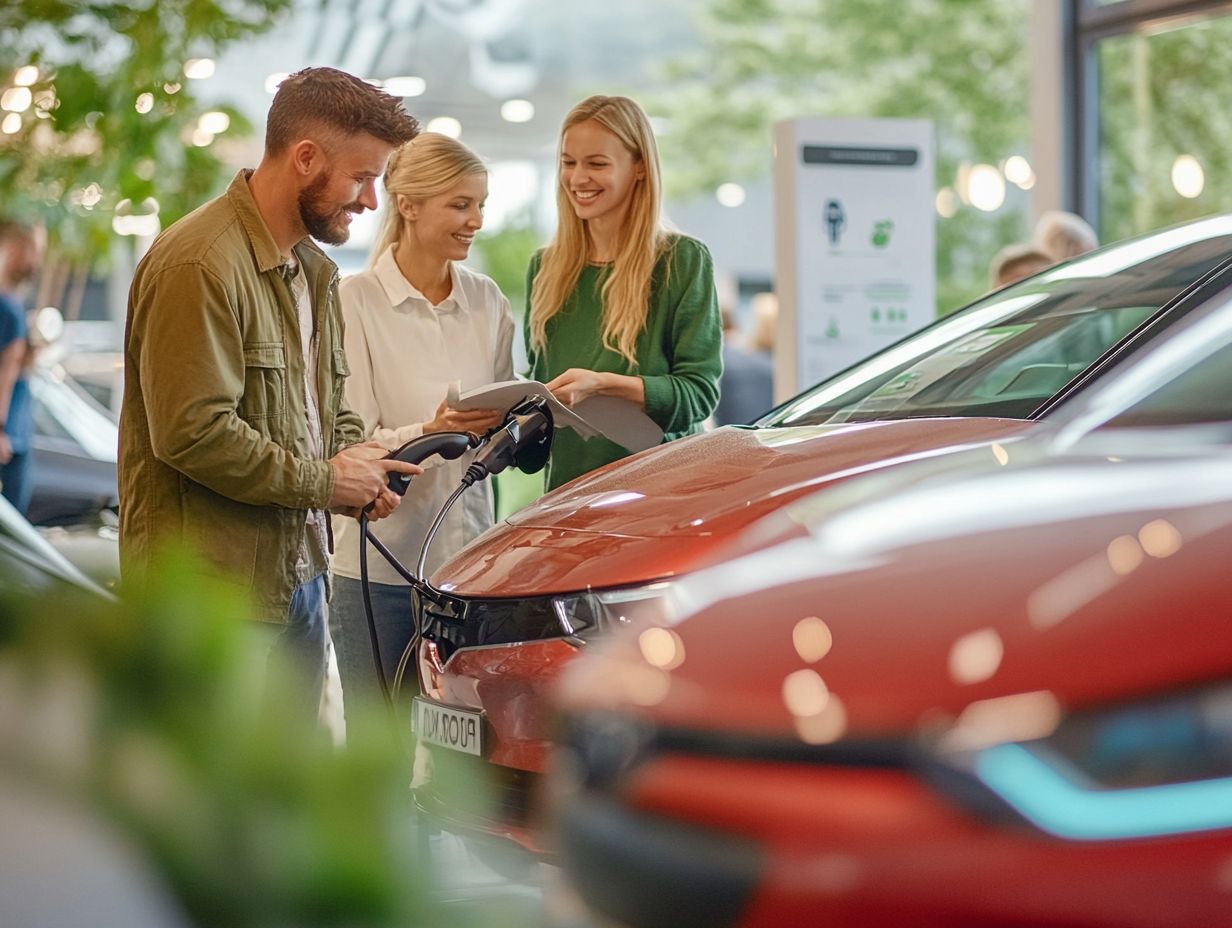
Popular electric vehicle models such as the Tesla Model 3, Ford Mustang Mach-E, and BMW i4 showcase a range of advanced features that are sure to catch your eye. With impressive battery life and state-of-the-art autopilot technology, these vehicles align with your preference for sustainability while elevating your driving experience through innovative technology and safety enhancements.
Take the Tesla Model 3, for example. Its extensive Supercharger network makes long-distance travel a breeze. The Ford Mustang Mach-E impresses with its stylish design and spacious interior, perfect for families seeking practicality. Meanwhile, the BMW i4 offers a luxurious driving experience, characterized by responsive handling and an advanced entertainment system.
These unique qualities greatly influence consumer perceptions, creating a sense of reliability and modernity that resonates with those who are environmentally conscious.
This seamless blend of practicality and environmental responsibility is capturing the interest of various consumer segments, solidifying the standing of these electric vehicles in the market.
Changing Trends in EVs
The evolving landscape of electric vehicles mirrors the growing trends in sustainable transportation and automotive innovation, shaped by your changing preferences and the competitive dynamics between traditional automakers and specialized EV manufacturers.
As the EV market expands, elements like grid modernization and the emergence of groundbreaking technologies significantly impact your preferences and purchasing decisions.
Shift Towards Sustainable Transportation
The shift toward sustainable transportation is a significant trend in the automotive sector. Consumers are prioritizing environmental impact and fuel efficiency more than ever in their purchasing decisions. This movement is reshaping attitudes, prompting automotive manufacturers to invest heavily in electric vehicles and innovative technologies that aim to reduce carbon footprints.
As awareness of climate change and dwindling fossil fuel resources grows, your demand for cleaner alternatives intensifies. You re now considering not only the upfront cost but also the long-term benefits of operating an electric vehicle, such as reduced operational expenses and lower emissions.
Regulatory measures, like tax incentives and stricter emission standards, play a crucial role in encouraging this transition. By highlighting the environmental benefits and fostering a market for cleaner technologies, it s clear that sustainability is not just a buzzword; it s an essential pillar guiding the future of automotive innovation.
This collective effort not only contributes to a healthier planet but also shapes your perception, making electric vehicles not just an option, but a preferred choice.
New Technology and Features in EVs
New technologies in electric vehicles are evolving at a breathtaking pace, particularly in key areas like battery life, charging infrastructure, and autopilot technology. These advancements significantly enhance the appeal of EVs, addressing concerns such as range anxiety while elevating your overall user experience.
Innovations like solid-state batteries, a new type of battery that lasts longer and charges faster, are on the horizon. This directly tackles one of the biggest barriers you might face as a potential buyer. The expansion of ultra-fast charging stations, strategically placed along major travel routes, provides greater convenience for your long-distance journeys. This improved infrastructure alleviates worries about running out of power, fundamentally transforming your travel options.
Smart features like advanced driver-assistance systems enhance the appeal of EVs while significantly boosting safety. This makes them even more appealing choices for those of you who are eco-conscious and seeking a sustainable driving experience.
The Impact of Consumer Preferences on the EV Market

Consumer preferences play a pivotal role in shaping the electric vehicle market. They directly influence purchasing decisions and guide the strategies of automakers.
As the demand for electric vehicles continues to rise, understanding consumer behavior becomes essential for companies looking to align with evolving preferences and seize emerging market opportunities.
Market Growth and Future Predictions
The electric vehicle market is about to explode with growth! Driven by new car technologies and increasing acceptance among consumers, future predictions indicate a steady rise in EV adoption.
Both traditional automakers and specialized EV manufacturers are expanding their offerings to meet this growing demand. As governments worldwide implement stricter emissions regulations and champion sustainable transportation initiatives, the shift toward electric mobility is gaining momentum.
Technological advancements, such as better battery efficiency and quicker charging solutions, are making EVs not just more appealing but also more accessible to a wider audience.
Consumer preferences are evolving, with many individuals now prioritizing:
- Eco-friendliness
- Cost-efficiency
Tax credits and subsidies make electric vehicles even more appealing. This suggests that the market will expand not just in volume but also diversify, featuring a broad range of models and capabilities designed to meet various needs.
Challenges and Opportunities for EV Manufacturers
EV manufacturers are navigating a landscape filled with both challenges and opportunities. With competition from traditional automakers and the pressing need to enhance charging station infrastructure, addressing these hurdles is essential for capturing a larger share of the growing electric vehicle market.
On top of that, they must contend with supply chain disruptions that affect battery production and components, all while facing consumer skepticism about range and reliability.
However, it s not all doom and gloom. The push for sustainable transportation paves the way for innovative technologies such as new types of batteries that improve efficiency and advanced recycling methods.
With governments worldwide incentivizing EV adoption, the regulatory environment is becoming increasingly favorable. By seizing these growth opportunities, manufacturers can enhance their product offerings and cultivate consumer trust, ultimately solidifying a stronger foothold in the ever-evolving automotive ecosystem.
Frequently Asked Questions
What are some factors that are changing consumer preferences in EVs?

Some factors that are changing consumer preferences in EVs include:
- Advancements in technology
- Government policies promoting sustainable transportation
- Concerns about climate change and air pollution
How have advancements in technology affected consumer preferences in EVs?
Advancements in EV technology, such as longer battery life, faster charging times, and improved performance, have made EVs a more practical and attractive option for consumers.
Are government policies promoting sustainable transportation impacting consumer preferences in EVs?
Yes, many governments around the world are implementing policies and incentives to encourage the adoption of EVs, leading to an increase in consumer interest and preference for these vehicles.
What role does climate change play in changing consumer preferences in EVs?
With growing concerns about climate change and the need to reduce carbon emissions, more consumers are considering EVs as a more environmentally-friendly option compared to traditional gasoline-powered vehicles.
How do consumer preferences in EVs differ from traditional gasoline-powered vehicles?
Consumer preferences in electric vehicles (EVs) focus more on range, charging infrastructure, and environmental impact. In contrast, traditional vehicle buyers often prioritize horsepower and fuel efficiency.
Will consumer preferences in EVs continue to change in the future?
Consumer preferences for EVs are likely to evolve as technology improves. What will influence consumer choices in the future? Cost, availability, and convenience will shape preferences as technology continues to advance!

